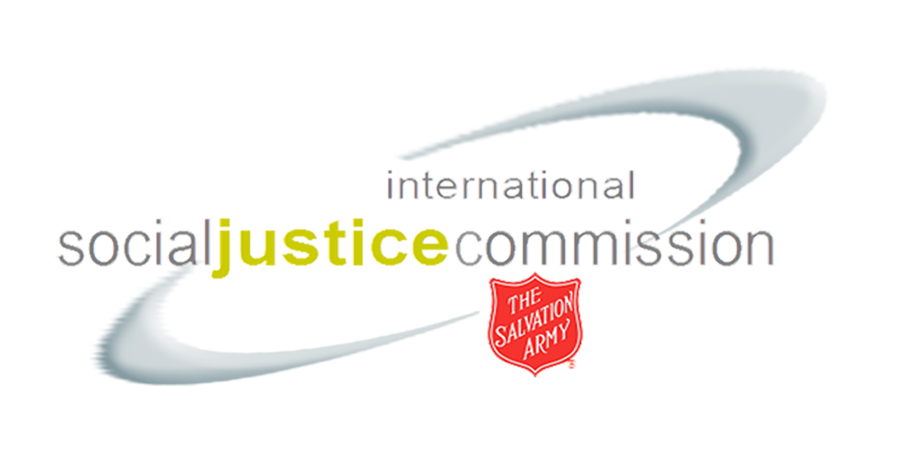|
ISJC News for Prayer and Thanksgiving
We thank God for the celebrations of
Christmas and the gift of his Son. We
pray for his presence in this New Year.
We thank God for his grace, wisdom
and patience during 2015. This was a
year of transition for the ISJC but we
give God the glory for the progress
made in the fight for social justice.
Please pray for Lieut-Colonel Dean
Pallant, Director of the ISJC and also
The Salvation Army’s International
Accountability Movement Coordinator,
as he leads the accountability
coordination group meetings this
month.
Please carry on praying for visas for the
ISJC interns. We continue to have
difficulties getting approvals from US
immigration officials.
SDG 4 Targets
• By 2030, ensure that all girls and boys complete free, equitable and quality primary and secondary education leading to relevant and effective learning outcomes.
• By 2030, ensure that all girls and boys have access to quality early childhood development, care and pre-primary education so that they are ready for primary education.
• By 2030, ensure equal access for all women and men to affordable and quality technical, vocational and tertiary education, including university.
• By 2030, substantially increase the number of youth and adults who have relevant skills, including technical and vocational skills, for employment, decent jobs and entrepreneurship.
• By 2030, eliminate gender disparities in education and ensure equal access to all levels of education and vocational training for the vulnerable, including persons with disabilities, indigenous peoples and children in vulnerable situations.
• By 2030, ensure that all youth and a substantial proportion of adults, both men and women, achieve literacy and numeracy.
• By 2030, ensure that all learners acquire the knowledge and skills needed to promote sustainable development, including, among others, through education for sustainable development and sustainable lifestyles, human rights, gender equality, promotion of a culture of peace and non-violence, global citizenship and appreciation of cultural diversity and of culture’s contribution to sustainable development.
• Build and upgrade education facilities that are child, disability and gender sensitive and provide safe, non-violent, inclusive and effective learning environments for all.
• By 2020, substantially expand globally the number of scholarships available to developing countries, in particular least-developed countries, small island developing states and African countries, for enrolment in higher education, including vocational training and information and communications technology, technical, engineering and scientific programmes, in developed countries and other developing countries.
• By 2030, substantially increase the supply of qualified teachers, including through international cooperation for teacher training in developing countries, especially least-developed countries and small island developing states.
|
The Millennium Development Goals (MDG) which shaped the development
agenda from 2000 to 2015 included the target to ‘Achieve Universal Primary
Education’. The deadline for that goal has just passed and yet, according to the
#UpForSchool campaign, ‘59 million children still don’t go to primary school
– and hundreds of millions more are not learning.’
(http://www.aworldatschool.org/issues)
Building on the MDG, Sustainable Development Goal 4 aims to finish the work of
having all boys and girls complete primary education. However, it goes
significantly beyond this target – it also aims to give universal secondary
education to children, improve access to universities, educate adults, provide
vocational training and educate in global citizenship.
This is an ambitious goal and it will require much change! The following facts and
figures illustrate where we are now:
- Enrolment in primary education in developing countries has reached 91 per cent but 57 million children remain out of school.
- More than half of children that have not enrolled in school live in sub-Saharan Africa.
- An estimated 50 per cent of out-of-school children of primary school age live in conflict-affected areas.
- 103 million youth worldwide lack basic literacy skills, and more than 60 per cent of these are women.
(http://www.un.org/sustainabledevelopment/education/)
Reflecting on Quality Education
God has created humankind with the ability to understand the world in which we
have been placed. He has made some of himself and his plans for life
discoverable by exercising our minds. In Genesis the first human is specifically
tasked to give names to creation and to work it:
‘The Lord God took the man and put him in the garden of Eden to till it and keep it
… So out of the ground the Lord God formed every animal of the field and every
bird of the air, and brought them to the man to see what he would call them; and
whatever the man called every living creature, that was its name’
(Genesis 2:1,19 NRSV).
It is our privilege and our duty to walk through the garden with our eyes open. We
are made not simply to be another animal within the body of nature but to shape
creation in partnership with God. We are to learn how to tend gardens, how to
make food, how to cook it, how to fix our bodies with medicine and how to care for
each other with love.
Not everyone needs to be a doctor or a farmer, but when we are unable to give
our fellow human beings access to the full opportunities of education we deprive
them of the ability to participate fully in God’s design for human life. More than
that, we rob our communities of the insight these people can give us. According to
the United Nations:
[Education] contributes to fostering peace, democracy and economic growth as
well as improving health and reducing poverty. Education beats poverty …
promotes gender equality … reduces child mortality … contributes to improved
maternal health … helps combat HIV, malaria and other preventable diseases …
encourages environmental sustainability … [and] helps global development.
(http://www.un.org/en/globalissues/briefingpapers/efa/)
This is not to say that education is going to save the world. The Bible is clear:
‘The fear of the Lord is the beginning of knowledge' (Proverbs 1:7a NRSV).
‘Trust in the Lord with all your heart and lean not on your own understanding’
(Proverbs 3:5 NRSV).
We cannot learn much about creation while ignoring the creator and some
knowledge is too wonderful for us to hold (Psalm 139:6). Education is not to
replace a trust in God. Still, when we learn about and explore our world with God
we find that it all points to him:
‘The heavens declare the glory of God; the skies proclaim the work of his hands’
(Psalm 19:1 NRSV).
‘For since the creation of the world God’s invisible qualities – his eternal power
and divine nature – have been clearly seen, being understood from what has
been made’ (Romans 1:20a NRSV).
Reflecting for Action and Prayer
Please take time to read the focus of the targets associated with this goal and pray
that God will equip and empower people, corps and the worldwide Church to take
action as they aim to bring quality education for all.
Specific Prayer Topics
- Pray for the Sustainable Development Goals that come into effect this month. Pray that they would help us partner with God and that they are not seen as a way to save ourselves without him.
- Pray for all teachers, school caretakers, head teachers, teaching assistants, professors, academic administrators and others who help us to gain education. Ask that God would give them strength, wisdom and rest as they work to increase our understanding.
- Pray for those who do not have access to the education they need, whether that is basic primary education, vocational knowledge or academic work.
- Pray that God would reveal areas in your life where you may seek greater understanding of his creation. Pray that he would give you wisdom.
|



























